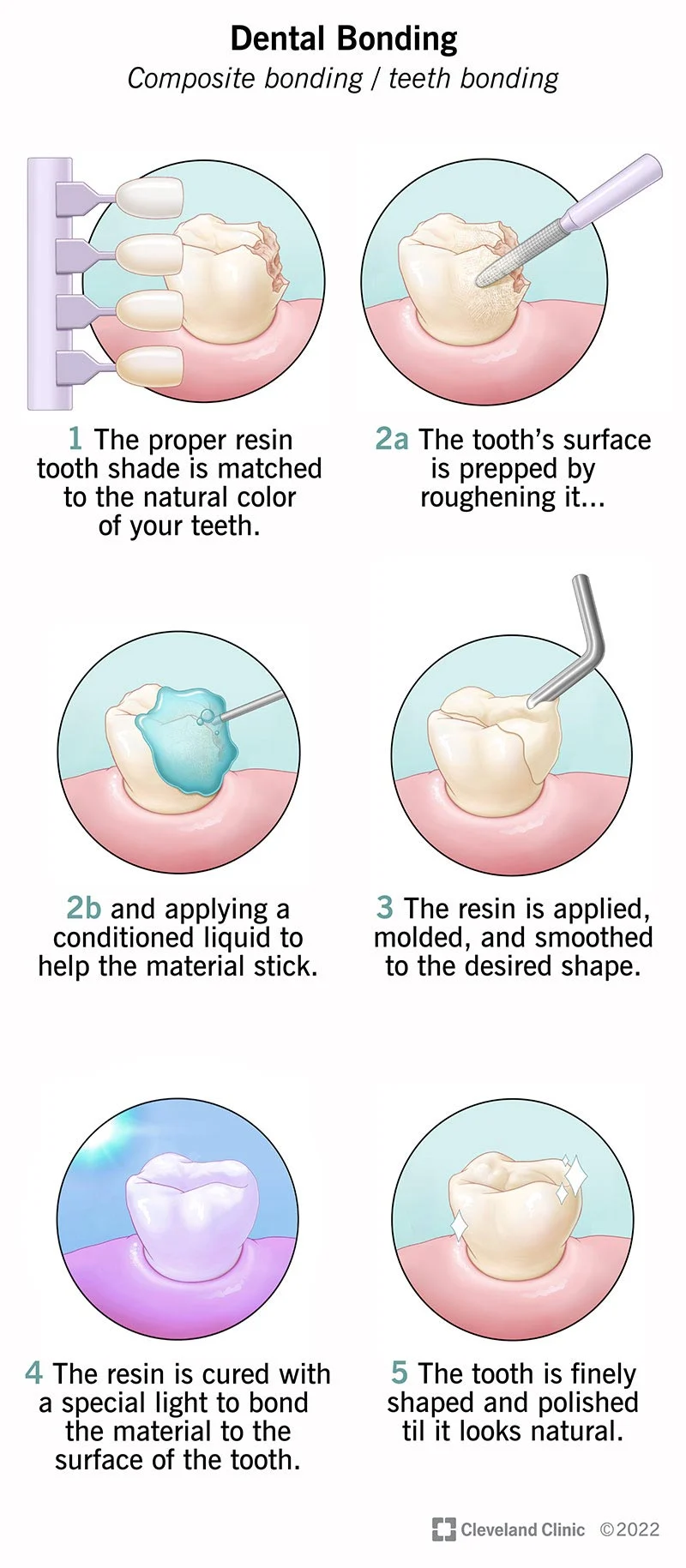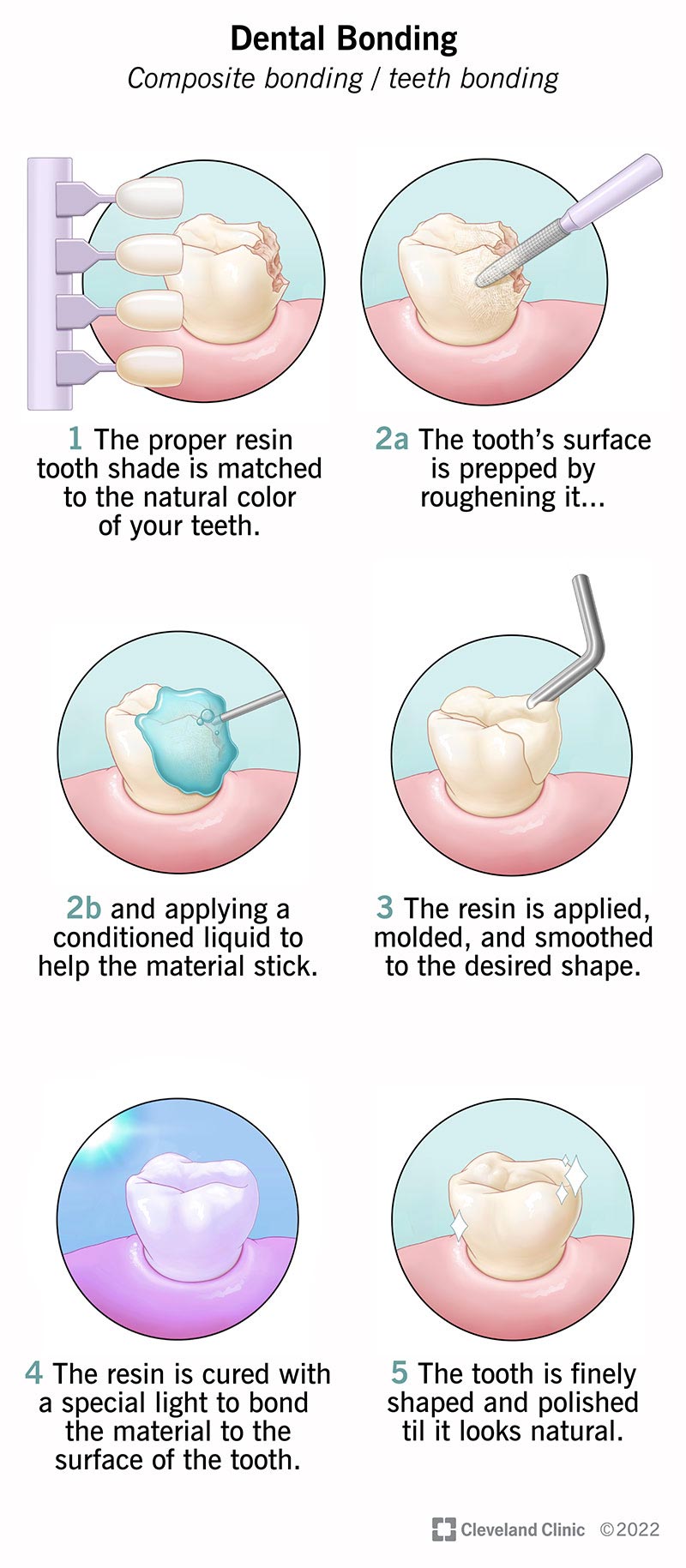
Dental bonding is a cosmetic procedure that addresses issues like chipped or discolored teeth. The process involves applying a tooth-colored resin to the teeth, which is then hardened with a special light. The setting time for dental bonding is typically 30 to 60 minutes per tooth, making it a quick and efficient solution for enhancing your smile. The dentist prepares the tooth, applies the resin, molds it to the desired shape, and uses a special light to set it in place. Dental bonding provides natural-looking results and is effective in fixing imperfections such as chips and discoloration. It’s a recommended option for those seeking a speedy smile transformation.
How Long Does Dental Bonding Take to Set?
Dental bonding is a popular cosmetic dental procedure that involves applying a tooth-colored resin material to repair a chipped, cracked, or discolored tooth. It is a relatively quick and painless procedure that can greatly improve the appearance of your smile. If you’re considering dental bonding, you may be wondering how long it takes for the material to set and what you can expect during the process. In this article, we will delve into the details of dental bonding and provide you with the answers you’re looking for.
Understanding Dental Bonding
Here is a quick overview of dental bonding procedure:
- Versatile Cosmetic Procedure:
- Dental bonding addresses various dental concerns.
- Involves applying tooth-colored resin to improve aesthetics.
- Commonly used for chipped, cracked, misaligned, or discolored teeth.
- Dental Bonding Process:
- Tooth preparation involves cleaning and roughening.
- Conditioning liquid ensures proper resin adhesion.
- Resin applied, sculpted, and shaped to match natural contours.
- Special light used to harden and set the resin in place.
Factors Affecting Bonding Time
- Size and Complexity:
- Bonding time varies based on the area’s size and complexity.
- Procedure can take 30 minutes to an hour per tooth.
- Type of Bonding Material:
- Light-cured resin sets quickly with special light activation.
- Self-cured resin sets on its own, taking slightly longer.
- Actual bonding time is short compared to other dental procedures.
The Dental Bonding Process
- Examination and Material Selection:
- Dentist examines teeth to determine suitability for bonding.
- Resin shade selected to match the natural teeth color.
- Tooth Preparation:
- Cleaning and roughening of the tooth surface.
- Conditioning liquid applied for proper adhesion.
- Resin Application and Shaping:
- Resin applied in layers and shaped to achieve desired results.
- Special light used for the curing process, taking a few minutes per layer.
- Polishing and Completion:
- Bonded tooth polished and smoothed for a natural fit.
- Entire process typically completed in a single visit.
Advantages of Dental Bonding
- Minimally Invasive and Conservative:
- Requires minimal removal of tooth structure.
- Conservative option for improving tooth appearance.
- Quick and Long-Lasting:
- Relatively quick procedure with noticeable results.
- Long-lasting outcomes with proper oral care and regular check-ups.
- Versatility:
- Addresses various dental concerns.
- Alternative to traditional fillings for a natural look.
Caring for Bonded Teeth
- Oral Hygiene Practices:
- Brush teeth twice a day, floss daily, and attend regular check-ups.
- Ensures the longevity of bonded teeth.
- Avoid Damaging Habits:
- Avoid biting on hard objects or chewing ice.
- Preserves the integrity of the bonding material.
In conclusion, dental bonding is a popular cosmetic dental procedure that can greatly improve the appearance of your smile. The bonding time can vary depending on factors such as the size and complexity of the bonding area and the type of bonding material used. The dental bonding process involves cleaning and preparing the tooth, applying the resin material, and using a special light to harden the material. Dental bonding offers several advantages, including minimal tooth structure removal, quick results, and long-lasting effects. By practicing good oral hygiene and avoiding habits that can damage the bonding material, you can enjoy the benefits of dental bonding for years to come.
Key Takeaways: How Long Does Dental Bonding Take to Set?
- Dental bonding typically takes about 30 to 60 minutes per tooth.
- The procedure involves applying a tooth-colored resin to the tooth and then using a special light to harden it.
- It’s a relatively quick and painless process that can be done in one visit to the dentist.
- After the bonding is set, you can eat and drink normally, but you should avoid biting or chewing on hard objects.
- The bonded tooth may need occasional touch-ups or replacements in the future.
Frequently Asked Questions
How long does dental bonding take to set?
When it comes to dental bonding, the setting time can vary depending on several factors. Generally, the bonding material used by dentists is a composite resin that is applied to the teeth. This resin is carefully shaped and molded to match the natural appearance of the patient’s teeth. Once the resin has been applied, it needs to be hardened or set in place.
The setting time for dental bonding can range from 30 to 60 minutes. However, it’s essential to note that this is just an estimate, and the actual time may vary based on the complexity of the procedure and the number of teeth being bonded. Your dentist will be able to provide you with a more accurate timeframe based on your specific situation.
What factors can affect the setting time of dental bonding?
Several factors can influence how long it takes for dental bonding to set. Firstly, the size and location of the bonded area can impact the setting time. Larger or more complex areas may require additional time to ensure a proper bond. Additionally, the type of bonding material used can also affect the setting time.
Furthermore, the skill and experience of the dentist play a significant role. An experienced dentist who is familiar with the bonding process can often complete the procedure more efficiently, resulting in a shorter setting time. It’s important to consult with your dentist to understand how these factors may affect your specific situation.
Are there any ways to speed up the setting time of dental bonding?
While the setting time of dental bonding is determined by various factors, there are a few techniques that dentists can use to expedite the process. One method is to use a specialized curing light, which emits a specific wavelength of light that helps accelerate the hardening of the bonding material.
Additionally, the use of advanced bonding materials that are specifically designed for quicker setting times can also reduce the overall procedure duration. Your dentist will determine the most suitable techniques and materials based on your individual needs and circumstances.
What should I expect during the setting time of dental bonding?
During the setting time of dental bonding, it’s important to remain still and avoid any activities that may disrupt the bonding process. Your dentist may provide you with specific instructions to follow during this time. It’s common to experience a mild sensation of pressure or discomfort as the bonding material sets and hardens.
It’s essential to communicate any significant discomfort or concerns to your dentist immediately. They will ensure that you are comfortable throughout the procedure and address any issues that may arise.
How long does dental bonding typically last?
The longevity of dental bonding can vary depending on several factors, including oral hygiene practices, dietary habits, and the extent of wear and tear on the bonded teeth. On average, dental bonding can last between 5 to 10 years.
To maximize the lifespan of dental bonding, it’s crucial to maintain good oral hygiene, avoid biting down on hard objects, and schedule regular dental check-ups. Your dentist will be able to assess the condition of the bonding during these visits and recommend any necessary maintenance or repairs.
How long does dental bonding last?
Final Thoughts
Dental bonding is highlighted as a convenient and efficient procedure for enhancing one’s smile. Taking approximately 30 to 60 minutes per tooth, it provides a quick and effective solution for cosmetic dental concerns like chipped teeth, small gaps, or discoloration. While the bonding sets rapidly, a few hours may be needed for complete hardening. Post-procedure precautions include avoiding hard or sticky foods. Adherence to dentist instructions for care and maintenance is emphasized to ensure the durability of the bonding material. Overall, dental bonding is praised as a cost-effective and time-efficient option, addressing various cosmetic issues and proving popular among those seeking a swift improvement in dental aesthetics.
Call or Book appointment online
:Ace Dental Care Alpharetta office: 678-562-1555 - Book Now
Ace Dental Care Norcross office: 770-806-1255 - Book Now
Disclaimer
This blog post was generated by artificial intelligence. The content of this post may not be accurate or complete, and should not be relied upon as a substitute for professional advice. If you have any questions about the content of this post, please contact us.
We are constantly working to improve the accuracy and quality of our AI-generated content. However, there may still be errors or inaccuracies. We apologize for any inconvenience this may cause.






